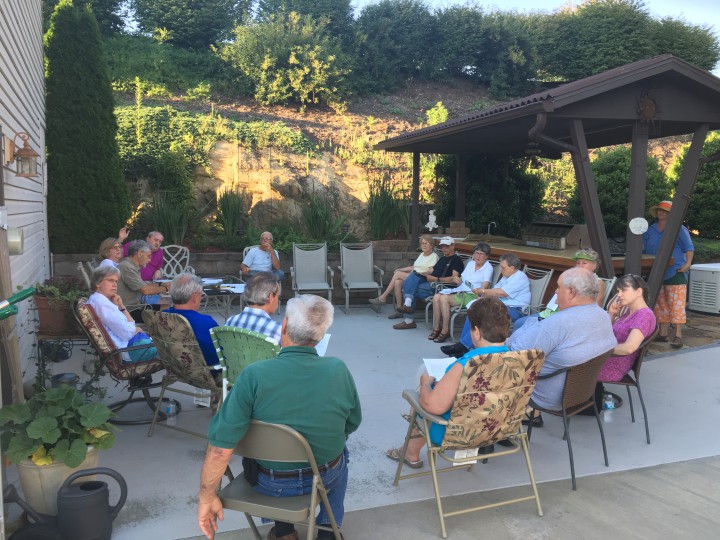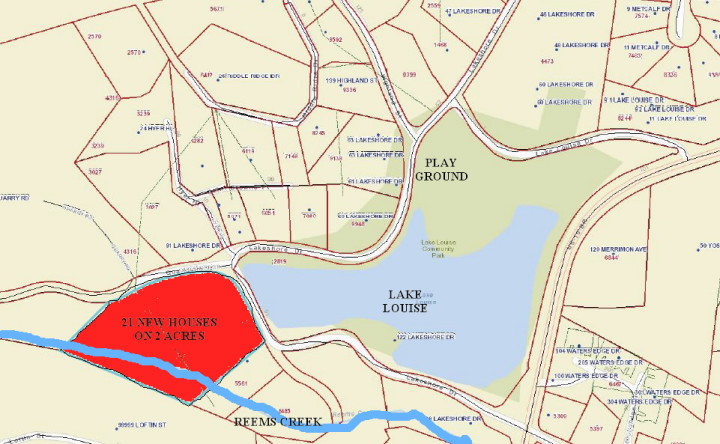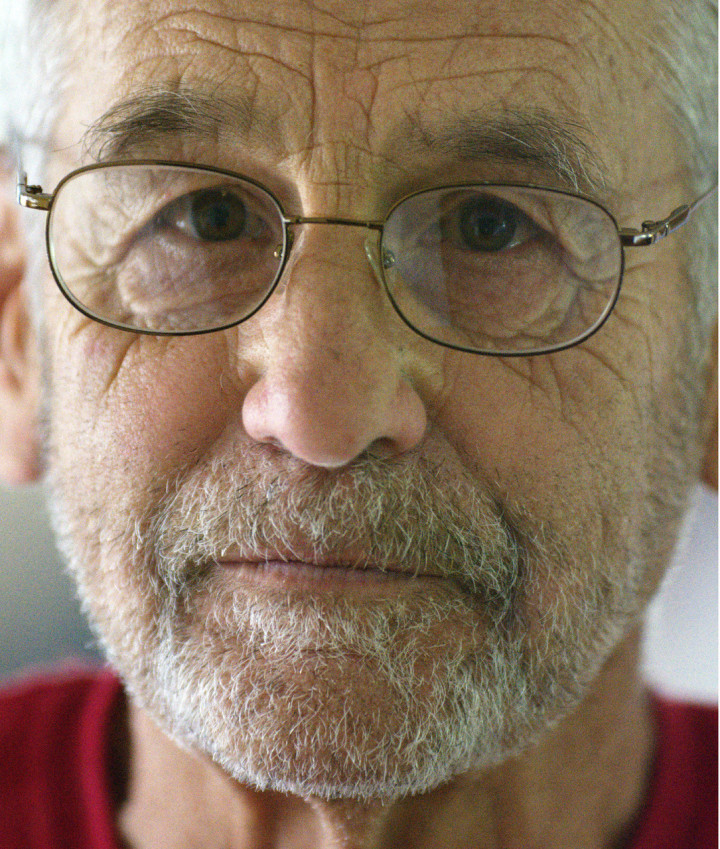BY TOM PLAUT
After a four-month fight led by a citizens group against a proposed development, Weaverville’s Zoning Board of Adjustment voted unanimously last month to reject a proposal to build 21 small houses on a 3.14-acre tract bordering Lake Louise Park. The late-night decision, rendered Oct. 19, provides insight into the democratic process in small-town government.
The opposition originated in the neighborhood surrounding Lake Louise Park. A few people — those who lived within 500 feet of the proposed development — had received a letter in mid-May announcing a Zoning Board of Adjustment hearing on the proposal. They went door to door introducing themselves to each other. They discovered that often they were very different kinds of people. Could Jim, the retired bread-truck driver, trust Tom, the retired college professor next door? People whose families had been in Weaverville for generations welcomed the newcomers, blue-collar workers welcomed their white-collar counterparts, and motorcyclists welcomed cyclists to create a rich mix of diversity.
Sixteen people came to the first meeting at the town park’s community center to talk about planning and development. Those 16, in turn, talked to friends, family and neighbors and canvassed the area. Fliers announcing the Zoning Board of Adjustment’s hearing were posted around the park and the town. At the May 23 hearing, the ZBA’s five-member panel was surprised to see a standing-room-only crowd packed into the hearing room.
But the citizens were in for their own surprise when they were told their comments didn’t count. The Zoning Board of Adjustment conducts “quasi-judicial hearings,” with procedures similar to a courtroom, while the Town Council is a legislative body. Any citizen can speak before a town council, but only attorneys, licensed experts and people “with standing” can talk in a ZBA quasi-judicial hearing. To achieve standing, one must prove he or she would be damaged if the proposed project were built.
“Why didn’t you say in the announcement letter that we would need lawyers and experts?” people asked. “Because that would prejudice the hearing,” was the official reply. When several citizens argued they should have standing to testify, they were cross-examined by the developer’s attorney, who then told the board that none of them were qualified, and their comments should be dismissed. The board then proceeded to approve the developer’s proposal, contingent upon a revised plan for parking. The matter-of-fact approval of the developer’s proposal and dismissal of citizen input stunned the audience. The following morning, one longtime resident tried to express his outrage to Town Hall staff; police were called to escort him from the building. Meetings at the community center were now subject to a rental fee and consequently were moved to a neighbor’s garage.

The feelings generated by these actions led to the creation of the Lake Louise Preservation Association in late June. LLPA bylaws state that its purpose is “to study proposals for housing and land development in the Town of Weaverville, N.C.; to publicize its findings for public review and debate, and to undertake advocacy for balanced growth.”
Lake Louise Preservation Association members encountered public pessimism about the public’s ability to challenge local government and its relationship with developers, who were seen as manipulating government for their own ends. Some argued that development proposals were passed in a routine manner without serious review. But preservation association members were not prepared for serious advocacy and action. Several months were required for group education, bake sales, flea markets and an auction, which enabled the hiring of required expertise and legal representation.
Members learned the difference between a Unified Housing Development proposal and a Conditional Housing Proposal. They learned that a UHD must be presented to the Zoning Board of Adjustment (the quasi-judicial body, operating like a court). Conditional Housing plans are presented to the Town Council (acting as a legislative body). The LLPA had to learn how to work in a quasi-judicial process.
Asheville attorney Bill Brazil agreed to take up the case and represent the preservation association. When the developer submitted his revised plan in August, Brazil found that the site had not been properly posted. This required the hearing process to start de novo (all over again), which bought more time for research and preparation.

Before the ZBA finally took up the case again in October, everybody — citizens, lawyers, the developer, engineers and attorneys — had paid attention to detail. Notebooks of data, photographs, maps and graphs portrayed elevation and water drainage, parking areas, lots and lot setbacks, and differences in project definition (is this a housing cluster, or multi- or single-family dwelling development?).
A multitude of questions had to be answered. Does the Americans with Disabilities Act apply? Is there room for baby carriages or wheelchairs? Are the slopes too steep for proposed recreation areas? Do road conditions allow for increased car and pedestrian traffic? Does the proposed development meet the public need for a specific kind of housing? Does it fit in with the surrounding area?
The process demanded a marathon of detail and persistence. Lake Louise Preservation Association members spent some 20 hours in meetings with Brazil and Asheville urban planner Blake Esselstyn, who argued there were some 70 problems in the proposal conditionally approved by the Zoning Board of Adjustment on May 23.
Five months later, on Oct. 12, the ZBA conducted a very different kind of hearing. A thoughtful, meticulous review of the proposal and codes lasted 7 ½ hours, adjourning at 2:30 a.m. on the following morning. Another four hours were required on Oct. 19 for final arguments and the board members’ deliberation and decision.
Ten to 12 hours of testimony, debate and decision-making may not make exciting news, but it’s important news about citizens asserting their right to have a say about what happens to their neighborhoods and communities. The Lake Louise Preservation Association’s action has resulted in the Weaverville Town Council considering the elimination of proposals for Unified Housing Developments. All new proposals would come before Weaverville Town Council as Conditional Housing Proposals, allowing for open and more democratic debate with citizen input.
As a footnote, this may not mark the end of the line for this proposal, since any developer can appeal a Zoning Board of Adjustment decision to Buncombe County Superior Court. But at this stage in the Lake Louise case, the citizen-advocates of the LLPA have done their job. It’s up to the town government to support and defend its ZBA’s decision.
As Buncombe County and its municipalities face the current rush of development, the Lake Louise Preservation Association provides an instructive case study for citizen action in land use and development proposals. Lake Louise Preservation Association representatives will continue to attend, observe and contribute to meetings of the Town Council, the Zoning Board of Adjustment, and the Planning and Zoning Board in ongoing efforts to make democracy work at the local level.
Tom Plaut is a professor emeritus of sociology from Mars Hill University. He is a member of the Lake Louise Preservation Association.




Note to developers: retirees have a lot of time on their hands. And these sound like they were smarter than the average bear.
Yo, Snowflake, is that a typo? I thought fer sher, you meant “Warrior”. As a slightly younger LLPA member, I felt it was my duty to collect quotes from the “retirees”: “This ain’t my 1st rodeo”, “We didn’t get this old by being stupid”, “We’re little, but we’re LOUD”. I contributed “Wake up Weaverville!”, & “More park, please!” Mine lack the grit of the 1st two, but I’m proud to be a “worrier”-in-training. These “retirees” are my heroes! Some are veterans of battles (many won) against local government. ALL have talents & experience I never knew about, before. I’m learning a lot from them. When I grow up, I want to be “smarter than the average bear”, too. ¿*>
As a Weaverville resident, I too am often alarmed at the pace of development in and around this beautiful small town. So I certainly understand the opposition of Lake Louise residents. But I know the developers, and they have been reviled for no good reason. They are decent people, just doing business, legally and ethically. And what of the property rights of the land owner? How do we justify taking away her right to sell her own land? I haven’t heard of any offer from the Lake residents to buy the property. Only some notion to shift the burden to the taxpayers. Now THAT would be unethical and immoral.
Hahahaha! That’s hilarious… ¿*>